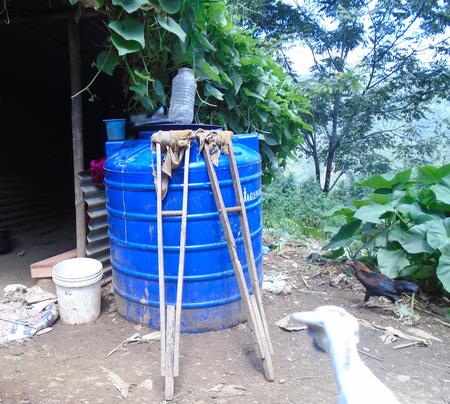We must ensure people with disabilities have dignity during menstruation

Interventions to improve menstrual hygiene management in developing countries are leaving people with disabilities behind. Without access to water, sanitation and hygiene during menstruation, dignity and opportunities erode. To raise the case for focusing on people with disabilities in menstrual hygiene programmes, we need to show how badly this is needed. Jane Wilbur and Johanna Naradzay describe the experiences Jane's research found in Nepal.
People with disabilities are some of the most marginalised in society, especially in poor communities. Stigma, inaccessible water, sanitation and hygiene (WASH) facilities and limited independence often result in them having limited access WASH services – vital for people to manage their periods with dignity.
The inequalities are even greater when disability combines with another aspect of identity that society discriminates against – for example, people with disabilities who menstruate can face additional exclusion. In many countries people are not permitted to participate fully in social, educational and religious activities while on their periods, and in some cultures are excluded from the home.
Shedding light on stories to drive action
'Leave no one behind' is a core commitment at the forefront of the Sustainable Development Goals. In order to stand by it, development programmes and policies must have a particular focus on the poorest and most marginalised groups.
Although many organisations implement inclusive WASH programmes, very few focus on ensuring menstrual hygiene management (MHM) programmes include people with disabilities. And there isn’t much detailed, concrete evidence of the discrimination people with disabilities face when menstruating.
To encourage disability inclusion in MHM interventions, we need to report the evidence and highlight what needs to change.
WaterAid and the London School of Tropical Medicine and Hygiene (LSTHM), with funding from the Gates Foundation, conducted research in Nepal to understand the specific MHM requirements of people with disabilities. Our research included exploring the issue with people with disabilities, carers, policy-makers and implementers.
Key findings: the layers of barriers
We found that many people with disabilities couldn’t access the WASH services they needed to manage their periods properly, meaning they lacked safety, privacy and dignity during menstruation.
The barriers differed depending on the impairment. For instance, people with physical impairments often reported being unable to use WASH facilities because they weren’t accessible or were too far away.
One woman with a visual impairment told us: "[The river] was not so far but the road was not good enough for me, and I am blind so I felt afraid that my clothes would be swept away by the river. I was afraid of sighted boys too…."
People with intellectual impairments often struggled to follow social norms around MHM. One carer said, "She would take [her pad] out and show it to others and would tell them to look at it. It was embarrassing." Another carer said, "She just walks like that with blood on her clothes." Showing menstrual blood in settings with strict menstrual restrictions can lead to physical and verbal abuse.
Although the WASH sector is making a huge effort to focus on MHM, interventions are predominantly based in schools. People with disabilities are less likely to go to school in Nepal,1 so miss out on information. And sometimes people with disabilities are excluded from school because they start menstruating. For example, one girl with an intellectual impairment was permanently excluded when she started her period because her teachers thought she wouldn’t be able to manage.
MHM interventions don’t tend to support carers to manage another person’s period, and they can also end up missing out on the intervention themselves. One mother, who couldn’t leave the house because of caring duties, said, "I hear that people come to our village to teach about those things, but I haven’t been taught about menstruation management. We don’t know anything else. I don’t go anywhere."
Realising human rights for all
People with disabilities are being left behind when menstruating. Their human rights to water and sanitation are being violated. WASH practitioners, duty-bearers and citizens have vital roles to play in changing this.
On the basis of our findings, WaterAid and LSTHM are now developing a groundbreaking disability-inclusive MHM behaviour change campaign specifically for people with intellectual disabilities in Nepal. This group faces additional challenges because generally they are unable to manage their menstruation independently, so are reliant on carers – carers need support to do this too.
Our campaign is a more nuanced approach to disability-inclusive MHM interventions that targets the specific access, information and support requirements of these groups to make sure they are met. It will be the first intervention of its kind.
Another example of WaterAid driving progress in this area by increasing the evidence base is research by Sarah Gelbard (Emory University MPH Grad Student) and Kirany Leap (WaterAid Cambodia Research Consultant). With more, stronger evidence we can build a stronger case and more effective campaigns, reaching more of the people who are being left behind.
We will document the development of our campaign in a series of further blogs – the next will shed light on the intervention design process. Watch this space!
Jane Wilbur is Research Fellow at the London School of Hygiene and Tropical Medicine. Johanna Naradzay is Programme Officer for Hygiene at WaterAid UK.
Banks LM et al (2018). Disability-inclusive social protection research: A national overview with a case study from Tanahun district.




